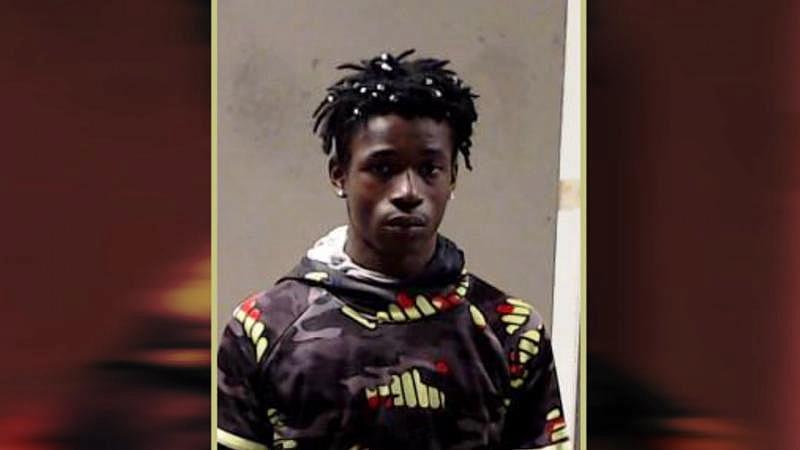Sexual exploitation, just one more danger to a mental health crisis
This story was produced as part of a project for the 2020 Data Fellowship, a program of the USC Annenberg Center for Health Journalism.
Other stories in this series by Rebecca Lindstrom include:
Georgia Families Struggling With Access To Mental Healthcare Will Soon See Changes
Broken furniture, broken hopes: Georgia mom stuck in loop trying to get help for son with autism
Teen finds team to score touchdown in life: How new DFCS program could prevent child abandonment
Homeless. Jail. Sexually exploited. The Game of Life never talked about this.
'I don't want to hurt nobody' | Woman with autism confronted by police
Georgia lawmakers commit to tackling child abandonment in next legislative session
Mom says she left note with abandoned child, police never found it

11 Alive
ATLANTA — We hear a lot about human trafficking and sexual exploitation. While most of us now know what those terms mean, there's less understanding of how women get trapped in those situations.
Untreated mental health and intellectual disabilities are potential paths. For months, 11Alive has discussed the challenges that lead families to abandon children with complicated special needs.
But Kayleigh's story shows that abandonment isn't the only risk.
There’s no statistic on how many dually diagnosed teens end up sexually exploited, but Katina Hall, a therapist at Wellspring Living says it is definitely an instigator.
Hall says predators find the girls they traffic within 48 hours of them running away. They always need new “merchandise” for what Hall says has become a $30 billion industry.
“Once they are out on the streets they have to survive. And the rent is not free,” Hall said.
Wellspring Living is a residential program for youth at risk or recovering from sexual exploitation. Hall drove 11Alive's Reveal investigator Rebecca Lindstrom around Atlanta showing some of the spots girls have reported being trafficked.
“[Traffickers] like places that are around gas stations and places like this where they have easy access to food within walking distance,” Hall said.
To keep the girls hidden, transactions are arranged on cell phones and social media, often on the same devices that lured girls away from their homes in the first place.
“That need for love, attention, and acceptance. That need for validation. Those are the primary keys that will call that young lady to that trafficker. And traffickers are smart in that way,” she said.
Indeed, it was Kayleigh's trusting nature and desire for companionship that put her in harm's way.
“I left with a friend I met at a group home,” she started.
The story had a familiar start. Kayleigh ran away. She’d done it several times before. Lindstrom asked if she left with a destination in mind, or if she just needed to be somewhere different.
“I just go sometimes. I just blackout and I don’t remember anything,” she said.
“Do you ever worry about what could happen to you when you go?” Lindstrom asks.
“Yes, but at the same time I sometimes, when I’m irritated, I don’t care. I just have to go,” Kayleigh answers.
In this incident, things didn’t work out with that friend from the group home and Kayleigh found herself back on the streets. She ran into someone she knew while hanging out in a fast-food parking lot planning her next steps. He offered her shelter.
She had no idea the invitation would eventually come with a catch. A woman also living in the apartment wanted her to earn her keep.
“She wanted me to sell my body that way her kids would have a roof over their heads,” Kayleigh said.
Sex for money. The woman found the clients and kept the money. She did the work.
“She made me feel guilty and feel like I had to do it. So I did. And I did not feel very good about it... so I left,” Kayleigh said.
Back on the streets again, she ended up on Fulton Industrial where a stranger offered her a place to stay.
“Then it was like doing the same thing that I was doing… so I left again,” Kayleigh said with a snap of her fingers, emphasizing how fast the cycle of exploitation seemed to repeat itself.
Kayleigh says this man used violence, insults, and intimidation to get her to stay.
“He had hit me in my eye and spit in my eye and told me that I was worthless,” she said.
“Did you ever think about calling your mom in all of this?” Lindstrom asked.
“I did but, I didn’t want anyone to think I was weak. When I did try to call, I got hands put on me and things thrown at me. I was like okay, I won’t do it,” Kayleigh responded.
Perhaps that’s why when she did have the strength to leave, she still didn’t go home. This time she ended up on Candler Road.
“This is where I met my rapist. He was really nice at first,” Kayleigh recalls.
But that really nice man, Rubio Bailey, would later be charged with rape and battery in DeKalb County.
Bailey has pleaded not guilty, but remains behind bars, denied bond.
Credit: DeKalb County Rubio Bailey
At his most recent bond hearing, Assistant DA Tauri Thomas told the judge, “What’s really concerning is that this victim has a number of developmental disabilities and it seems that the defendant has preyed on that and has taken advantage of that.”
“I think people are great people and then they show me they’re not. And then they want me to forgive them like everything is supposed to be okay. It’s not,” she said.
Kayleigh makes reference to a song she feels parallels some of her experiences, Dirty Laundry by Kelly Rowland.
The words, “He hittin’ the window like it was me, until it shattered. He pulled me out, he said, "Don't nobody love you but me. Not your mama, not your daddy…”
“That’s what he [Bailey] told me. You know what? He didn’t love me. When you make yourself look like you have nobody, that’s why they do that,” Kayleigh said. “I’m just stuck in this really depressing place right now. And I really don’t know how to get out of it.”
Kayleigh starts to sing again. The words of the song, “When you make pain look this good it never wears out…. this dirty laundry, this dirty laundry.”
This story was told as part of a 2020 Data Fellowship with the USC Annenberg Center for Health Journalism.
[This article was originally published by 11Alive.]
